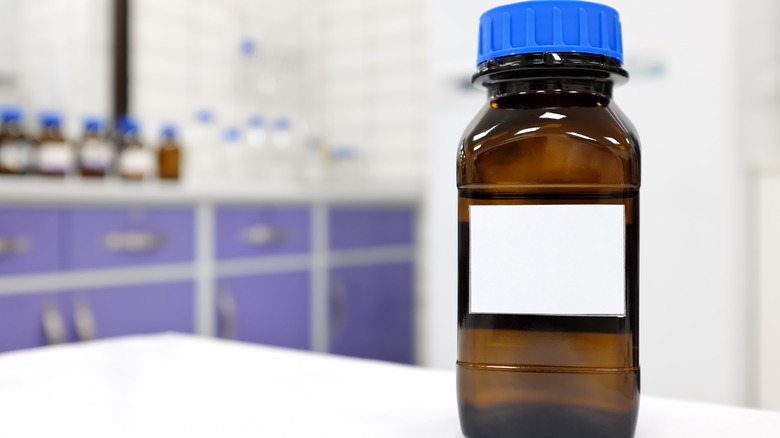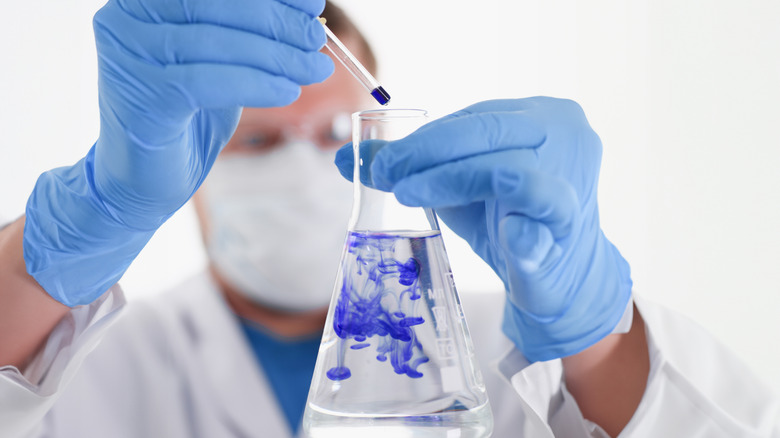Eriochrome Black T Solution Preparation
We may receive a commission on purchases made from links.
In chemistry, reagents are compounds or substances that trigger a chemical reaction. That's why they're used in a wide variety of tests, such as those to measure pH levels, determine blood glucose levels, illnesses, and pregnancy. When it comes to testing for the presence of metal ions in water, an Eriochrome Black T solution is one of the go-to reagents. Knowing precisely how to calculate and mix chemical solutions like this, however, is essential for experimental accuracy.
Like with any chemistry exercise, you want to start by putting on gloves and safety glasses to protect your skin and eyes. To make the solution, you will a precision scale, an EBT powder like HiMedia Eriochrome Black T (Practical Grade), a hydroxylamine hydrochloride powder like HiMedia GRM1028-100G Hydroxylamine Hydrochloride, ethanol like Belle Chemical Medical Grade Ethanol — one of the main types of alcohol — a beaker with a 100-milliliter capacity and stirring rod, and either a glass dropper bottle or reagent bottle.
Set the beaker on the precision scale, and press the tare button to zero out the weight. For a 0.5%-weight-by-volume solution, put 0.5 grams of the EBT powder in the beaker using a tiny spoon or spatula, and push tare again before adding 2 grams of the hydroxylamine hydrochloride powder. Next, add just enough ethanol to dissolve the powders, stirring with a glass rod. Finally, finish diluting the solution with the ethanol up to the 100-milliliter mark on the beaker, ensuring that it's mixed well. You can store the solution for several weeks in a dropper or reagent bottle.
Applications and usage of EBT solution
As a hydroxyl-arylazo dye, EBT powder looks dark violet with a shimmer of metallic green, and its color is useful for dyeing textiles like fur, nylon, silk, and wool. When it's used to make an indicator solution, it has a very dark and deep blue appearance — almost black. An EBT solution is particularly useful in ethylenediaminetetraacetic acid (EDTA) complexometric titrations — one of several types of titration — which makes it ideal for testing water quality for a science project.
For a water test, fill a conical glass with a bit of water. It doesn't have to be full but enough so that you can see the chemical changes in the water during the experiment. Add just a few drops of the EBT solution, give the flask a swirl, and watch for a color transformation to estimate pH levels without test strips in a range rather than a specific value. The water will turn wine red if the pH is less than 6.3, blue if it's between 6.3 and 11.6, and orange if it's more than 11.6. A wine-red color is also an indicator that the EBT has bound with free calcium, magnesium, and other metal ions, which may obscure the pH estimate if these are present in the water being tested.
You can take the experiment further into a complexometric titration. For this, you will need to make an EDTA solution, and slowly add it to the water that is already red because of the addition of EBT and metal ions present. Since EDTA binds better to metal ions, adding enough will reverse the chemical reaction of the EBT. The process is slower, but it will eventually turn the water blue. Knowing the concentration of the EDTA solution and how much it took to turn the water blue, you can determine the water hardness.

